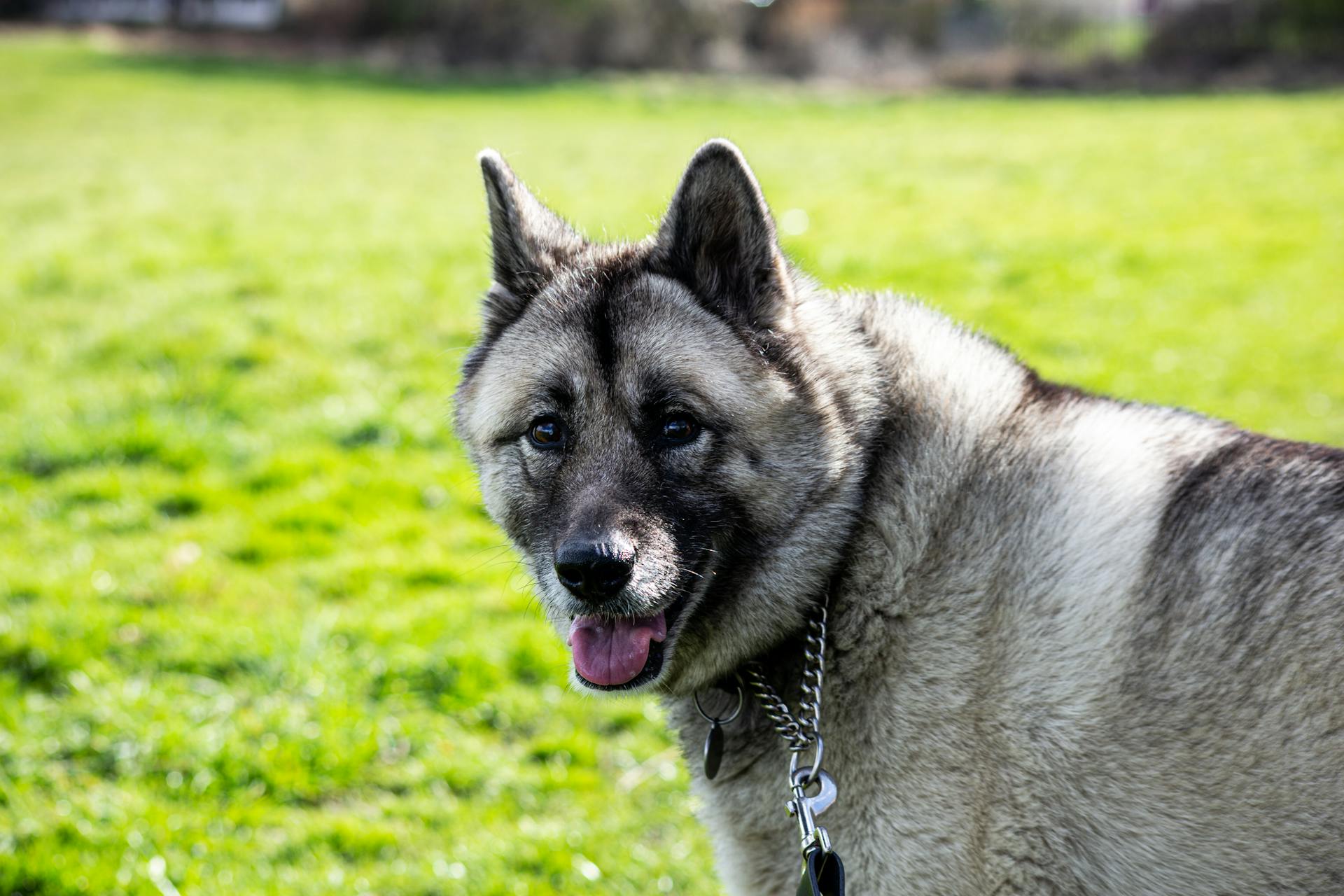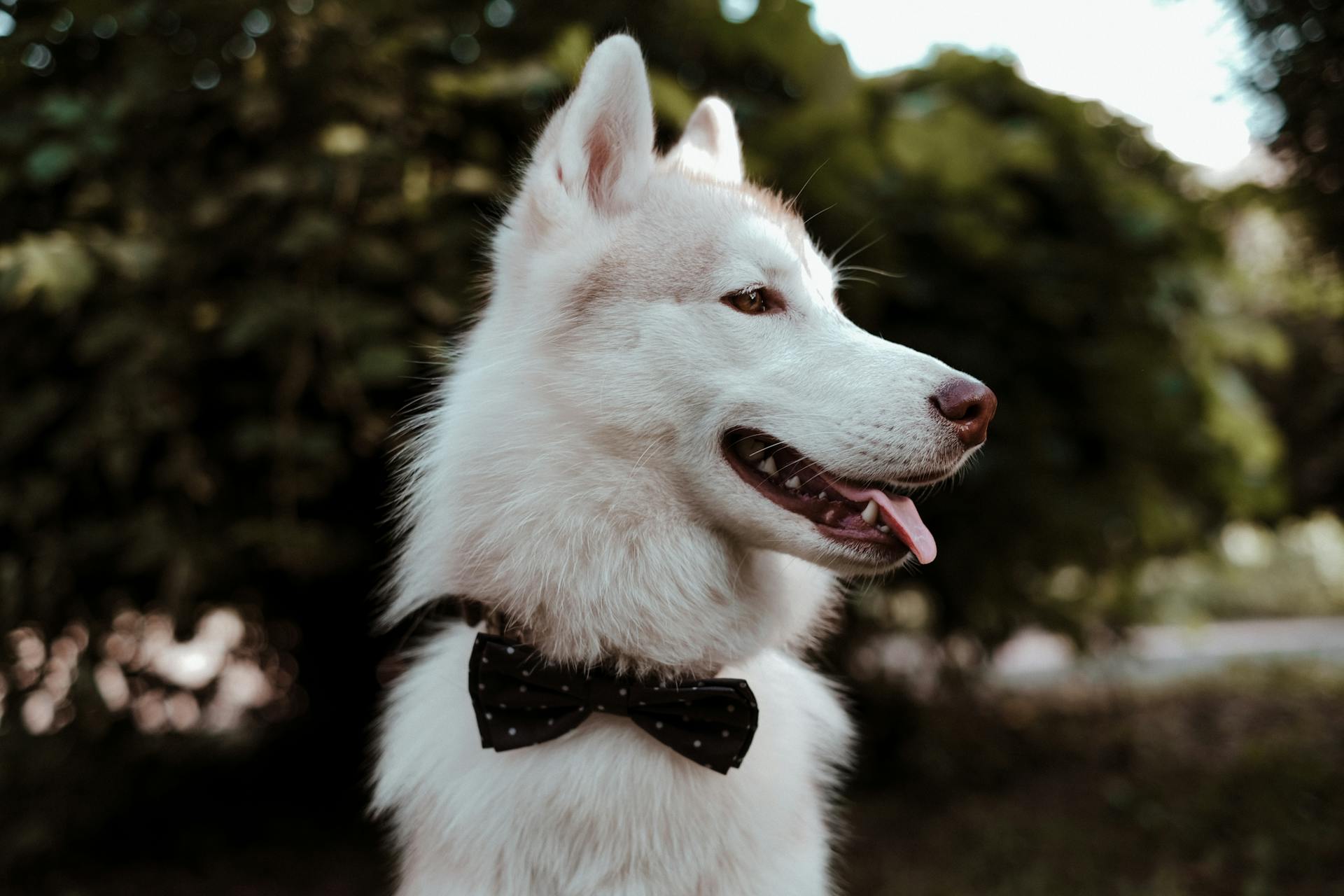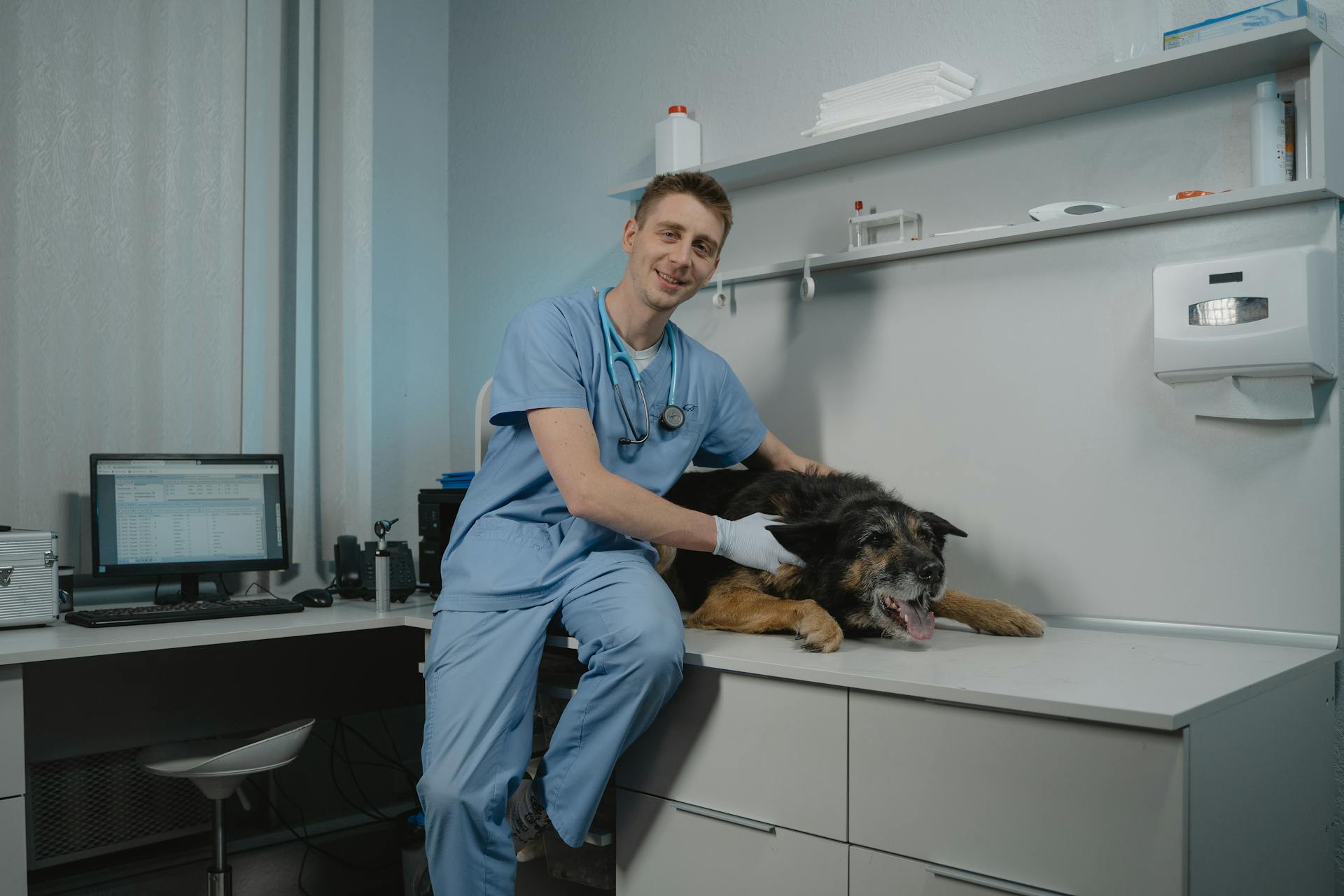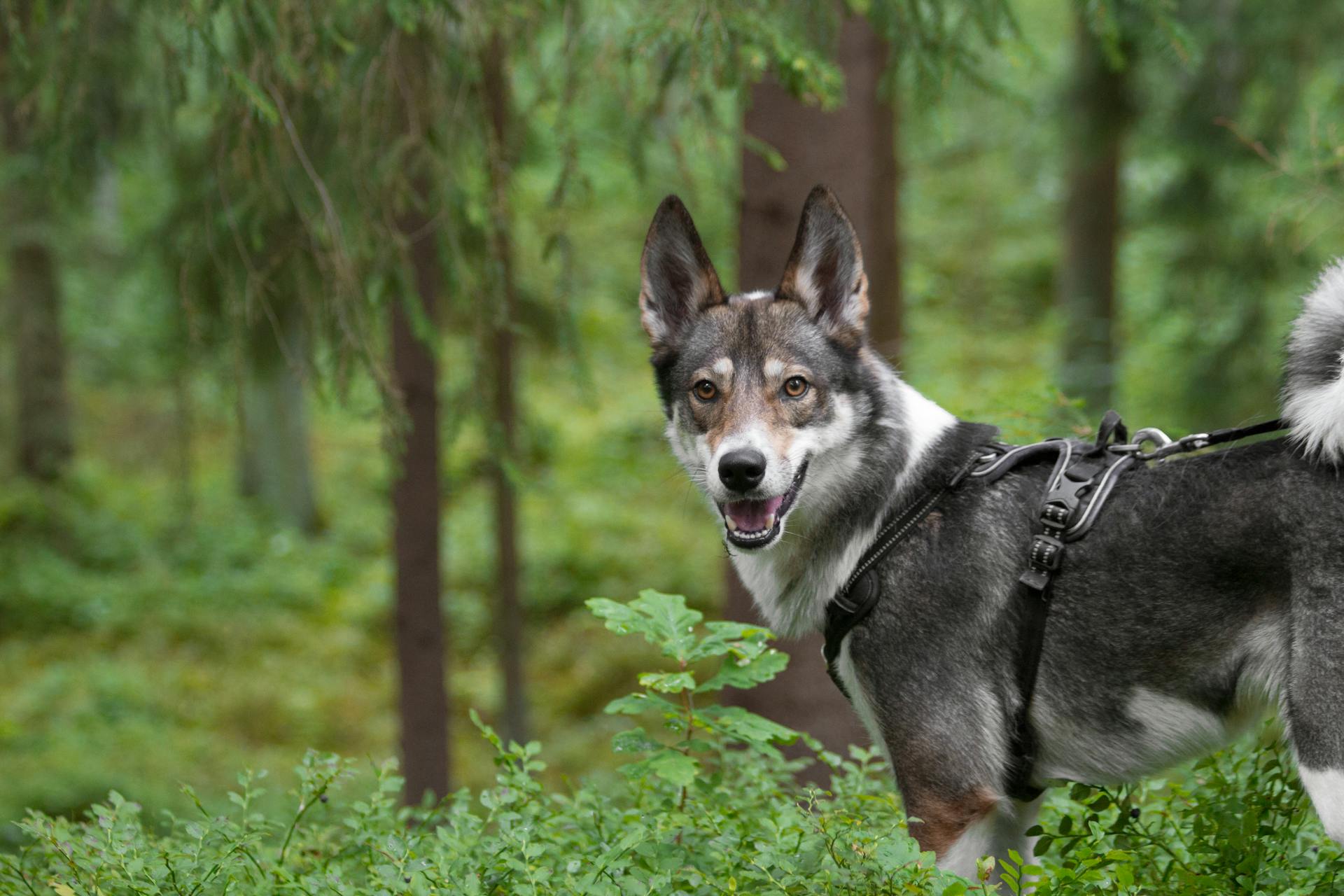
As a responsible Norwegian Elkhound owner, it's essential to be aware of the potential health issues that can affect your furry friend. Hip dysplasia is a common issue in Norwegian Elkhounds, with 37% of males and 22% of females affected.
Norwegian Elkhounds are also prone to eye problems, with cataracts and progressive retinal atrophy being two of the most common issues.
Regular exercise and a balanced diet can help prevent obesity, a major contributor to joint problems like hip dysplasia.
Common Health Issues
As a Norwegian Elkhound owner, it's essential to be aware of the common health issues that can affect your furry friend. One of the most significant health concerns is periodontal disease, which can be prevented by brushing your dog's teeth daily.
Many diseases and health conditions are genetic, meaning they are related to your pet's breed. Norwegian Elkhounds are prone to certain genetic predispositions, including osteosarcoma (bone cancer), which can weaken bones and cause fractures.
You should also be on the lookout for abnormal symptoms, such as changes in appetite or water consumption, tartar build-up, bad breath, red gums, or broken teeth. These can be signs of serious disease or minor problems, and it's crucial to know when to seek veterinary help.
Here are some common health issues to watch out for in your Norwegian Elkhound:
- Change in appetite or water consumption
- Tartar build-up, bad breath, red gums, or broken teeth
- Itchy skin (scratching, chewing, or licking), hair loss
- Lethargy, mental dullness, or excessive sleeping
- Fearfulness, aggression, or other behavioral changes
Eye and Skin Problems
Norwegian Elkhounds can inherit or develop a number of different eye conditions, some of which may cause blindness if not treated right away, and most of which can be extremely painful.
Glaucoma, a medical emergency, is an extremely painful disease that rapidly leads to blindness if left untreated, with symptoms including squinting, watery eyes, bluing of the cornea, and redness in the whites of the eyes.
Glaucoma is a medical emergency, so if you see symptoms, don't wait to call your veterinarian, go to an emergency clinic.
For another approach, see: Is Kennel Cough an Emergency
Cataracts are a common cause of blindness in older Elkhounds, with symptoms including cloudy lenses, and many dogs adjust well to losing their vision and get along just fine.
Surgery to remove cataracts and restore sight may also be an option.
Progressive Retinal Atrophy (PRA) is an inherited disease in which the eyes are genetically programmed to go blind, with symptoms including night blindness or dilated pupils, and it's not painful but also not curable.
A genetic test is available for this condition, and it's available for dogs with the bad gene, early symptoms begin around three to five years of age.
Keratoacanthoma, a common skin condition, produces a twisted knob on the back, tail, and legs of middle-aged Elkhounds, and some dogs find it annoying and attempt to scratch, rub, or bite it off.
A unique perspective: Symptoms of Twisted Stomach in Cats
Eye
Eye problems can have a dramatic impact on your dog's quality of life.
Glaucoma is an extremely painful disease that rapidly leads to blindness if left untreated. It's a medical emergency, so if you see symptoms like squinting, watery eyes, bluing of the cornea, or redness in the whites of the eyes, don't wait to call your vet – go to an emergency clinic right away.
Discover more: Pug Dog Eyes Pop Out
Cataracts are a common cause of blindness in older dogs, but many adjust well to losing their vision and get along just fine. Surgery to remove cataracts and restore sight may also be an option.
Progressive Retinal Atrophy (PRA) is an inherited disease that's not painful, but also not curable. In dogs with the bad gene, early symptoms like night blindness or dilated pupils can begin around three to five years of age.
Skin Problem
Keratoacanthomas are annoying little tumors that form on middle-aged Elkhounds, most frequently on the back, tail, and legs.
These tumors are caused by a rowdy clump of skin cells that try to produce a toenail, but they aren't very good at it, resulting in a twisted knob instead.
Some dogs find these abnormal horns annoying and try to scratch, rub, or bite them off, which can be a problem for their owners.
Surgical removal is the treatment of choice for Keratoacanthomas, which is a relatively straightforward procedure to get rid of these pesky growths.
For another approach, see: Mammary Tumors in Guinea Pigs
Infections and Abnormalities
Norwegian Elkhounds are susceptible to bacterial and viral infections, such as parvo, rabies, and distemper, which can be preventable through vaccination.
Many of these infections can be prevented with the right vaccination schedule, taking into account the diseases prevalent in your area, your dog's age, and other factors.
These infections can have serious consequences if left untreated, so it's essential to stay on top of your dog's vaccinations and health checks.
Teeth abnormalities are often genetically induced and relatively common in purebred dogs like the Norwegian Elkhound, with conditions like malocclusion, oligodontia, and misaligned teeth being prevalent.
An overbite or underbite can be corrected with braces or extractions, and misaligned teeth can cause a range of problems, but are usually manageable with dental care.
For more insights, see: Mobile Vaccination Clinic for Dogs
Hip Dysplasia
Hip dysplasia is an inherited disease that causes the hip joints to form improperly and leads to arthritis, which is common in Norwegian Elkhounds.
You may notice that your dog has lameness in his hind legs or difficulty getting up from lying down, which are symptoms of hip dysplasia. Surgery is sometimes considered in severe and life-limiting cases of hip dysplasia.
Many older dogs have arthritis, and bigger dogs tend to have more pain and disability than smaller dogs. Norwegian Elkhounds are particularly prone to developing arthritis, for which we need to use many treatments.
The earlier we begin treatment, the better the results. Good nutrition and proper exercise are also very important to help reduce bone and joint problems as your pet gets older.
Overweight dogs may develop arthritis years earlier than those of normal weight, causing undue pain and suffering. Do not let your dog become overweight, as this puts a huge strain on the joints.
On a similar theme: Older Maltese Dogs
Kidney Disorders
Glomerulonephropathy is an inherited disease that slowly damages your Norwegian Elkhound's kidneys, causing them to fail often at an early age.
Early detection of this disease through yearly urine analysis can lead to a happier pet and an easier, more affordable treatment plan.
Damaged kidneys leak protein, which can be detected by testing your dog's urine for excessive protein.
Recommended read: Signs of Ivdd in Dachshunds

A special diet may be recommended as part of the therapy plan to help manage the disease.
Fanconi syndrome is a disorder of the kidneys that allows vital blood nutrients to escape into the urine.
Affected Elkhounds can experience excessive urination and thirst, weight loss, and weakness from abnormal electrolyte levels.
Symptoms usually appear between two and six years of age.
Routine urine screening can help diagnose Fanconi syndrome in its early stages, and prompt treatment can greatly extend your pet's lifespan and quality of life.
The severity and course of the disease vary from dog to dog, with some remaining stable for years and others falling into fatal kidney failure.
See what others are reading: Blue Doberman Syndrome
Epilepsy
Epilepsy is a common issue in dogs, affecting many breeds, but Norwegian Elkhounds are particularly prone to it.
There are three types of seizures in dogs: reactive, secondary, and primary. Reactive seizures are caused by the brain's reaction to a metabolic problem like low blood sugar, organ failure, or a toxin.

Secondary seizures are the result of a brain tumor, stroke, or trauma. If no other cause can be found, the disease is called primary, or idiopathic epilepsy.
This problem is often an inherited condition. If your friend is prone to seizures, they will usually begin between six months and three years of age.
An initial diagnostic workup may help find the cause. Lifelong medication is usually necessary to help keep seizures under control, with periodic blood testing required to monitor side effects and effectiveness.
If your dog has a seizure, carefully prevent him from injuring himself, but don’t try to control his mouth or tongue. It won’t help him, and he may bite you accidentally!
A fresh viewpoint: What Do Border Collies Usually Die from
Infections
Norwegian Elkhounds are susceptible to bacterial and viral infections, just like all dogs. These can include parvo, rabies, and distemper.
Many of these infections are preventable through vaccination. We'll recommend a vaccination plan based on the diseases we see in our area, your dog's age, and other factors.
A fresh viewpoint: Free Vaccination Clinic for Dogs
Parvo, rabies, and distemper are serious health issues that can affect Norwegian Elkhounds. It's essential to take preventative measures to keep your dog safe.
Vaccination is a crucial step in protecting your Norwegian Elkhound from these infections. We'll work with you to create a vaccination schedule tailored to your dog's needs.
Preventing infections is a top priority when it comes to your Norwegian Elkhound's health. By staying on top of vaccinations and monitoring your dog's health, you can help prevent these serious health issues.
Worth a look: Vaccination Sites for Dogs
Abnormalities
Dental Abnormalities are relatively common in dogs, especially purebred dogs like Elkhounds. They can be genetically induced and may cause problems like misaligned teeth.
An overbite or underbite is called a malocclusion, or bad bite. Oligodontia is a condition where only a few teeth are present. Misaligned teeth can usually be corrected with braces or extractions.
Dogs can indeed get braces, and it's a great way to correct misaligned teeth. We want to keep your buddy's teeth healthy, so we'll be watching his developing teeth closely.
Sometimes a sweat gland goes berserk and grows out of control until it gets about as big as a grape, then pops. Gross, but not usually too painful. They are fairly common on many Elkhounds.
Check this out: What Do Dachshunds Usually Die from
Thyroid and Hormonal Issues
Norwegian Elkhounds are prone to a common condition called hypothyroidism, where the body doesn't make enough thyroid hormone.
This can lead to dry skin and coat, hair loss, susceptibility to other skin diseases, weight gain, fearfulness, aggression, or other behavioral changes.
We'll conduct a blood screening test annually to screen for the disease.
Treatment is usually simple: replacement hormones given in the form of a pill.
Regular check-ups and monitoring can help catch hypothyroidism early, making it easier to manage and treat.
This is especially important for Norwegian Elkhounds, as they're prone to this condition.
By staying on top of their health, you can help your Elkhound live a long and happy life.
For another approach, see: Are Goldendoodles Prone to Cancer
Disease and Emergencies
Your Norwegian Elkhound is more likely than other dogs to have problems with her teeth, affecting 80% of all dogs by age two.
Dental disease starts with tartar build-up on the teeth and progresses to infection of the gums and roots of the teeth. If left untreated, it can lead to your dog losing her teeth and being in danger of damaging her kidneys, liver, heart, and joints.
In fact, your Norwegian Elkhound's life span may be cut short by one to three years if dental disease is not prevented or treated. We'll clean your dog's teeth regularly and let you know what you can do at home to keep those pearly whites clean.
Here are some signs of emergencies to watch out for:
- Scratching or shaking the head, tender ears, or ear discharge
- Inability or straining to urinate; discolored urine
- Cloudiness, redness, itching, or any other abnormality involving the eyes
- Leg stiffness, reluctance to rise, sit, use stairs, run, jump, or “bunny hopping”
- Increased hunger and thirst, weight loss
- Any abnormal shaking, trembling, or excessive involuntary tremors
- Dull coat, hair loss, sluggish, weight gain
Disease
Dental disease is a serious problem that affects 80% of all dogs by age two, and Norwegian Elkhounds are more likely than other dogs to have problems with their teeth.
Tartar build-up on the teeth is the first sign of dental disease, which can progress to infection of the gums and roots of the teeth if left untreated.
If we don’t prevent or treat dental disease, our furry friends will lose their teeth and be in danger of damaging their kidneys, liver, heart, and joints.
This can even cut their life span short by one to three years. We’ll clean your dog’s teeth regularly and let you know what you can do at home to keep those pearly whites clean.
Explore further: Dental Health Diets for Dogs

Here are some signs of dental disease to look out for:
- Scratching or shaking the head, tender ears, or ear discharge
- Inability or straining to urinate; discolored urine
- Cloudiness, redness, itching, or any other abnormality involving the eyes
- Leg stiffness, reluctance to rise, sit, use stairs, run, jump, or “bunny hopping”
- Increased hunger and thirst, weight loss
- Any abnormal shaking, trembling, or excessive involuntary tremors
- Dull coat, hair loss, sluggish, weight gain
Emergencies
If you notice any of the following signs in your pet, seek medical care immediately. Scratching or shaking the head, tender ears, or ear discharge can be a sign of an ear infection.
Inability or straining to urinate, or discolored urine, can indicate a urinary tract issue. This is a serious problem that requires prompt attention.
Cloudiness, redness, itching, or any other abnormality involving the eyes can be a sign of an eye infection or other eye problem. This can be painful for your pet and can lead to blindness if left untreated.
Leg stiffness, reluctance to rise, sit, use stairs, run, jump, or "bunny hopping" can be a sign of arthritis or other joint issues. This can make it difficult for your pet to move around and can be painful.
Increased hunger and thirst, weight loss, can be a sign of a metabolic issue or other underlying health problem. This can be a sign of diabetes or other metabolic disorders.
Readers also liked: Free-ranging Dog Issue of Kerala
Any abnormal shaking, trembling, or excessive involuntary tremors can be a sign of a neurological issue. This can be caused by a variety of factors, including poisoning or other toxins.
Dull coat, hair loss, sluggishness, and weight gain can be a sign of a hormonal issue or other underlying health problem. This can be caused by a variety of factors, including hypothyroidism or other hormonal disorders.
Here is a list of emergency signs to watch out for:
- Scratching or shaking the head, tender ears, or ear discharge
- Inability or straining to urinate; discolored urine
- Cloudiness, redness, itching, or any other abnormality involving the eyes
- Leg stiffness, reluctance to rise, sit, use stairs, run, jump, or “bunny hopping”
- Increased hunger and thirst, weight loss
- Any abnormal shaking, trembling, or excessive involuntary tremors
- Dull coat, hair loss, sluggish, weight gain
Caring for Your Elkhound
Caring for your Norwegian Elkhound requires attention to her diet, exercise, and grooming needs. Regular brushing is essential, especially during shedding season when daily brushing is recommended.
You should supervise your pet as you would a toddler, keeping doors closed and picking up after yourself to prevent her from getting into trouble. Keep her out of rooms that contain hazardous materials or objects she shouldn't put in her mouth.
Brushing your Elkhound's teeth at least twice a week can help keep them perfect. Regular ear cleaning is also crucial, even from a young age.
A high-quality diet appropriate for your Elkhound's age is essential, and you should avoid giving her people food. Consistency is key when it comes to her diet, and overexertion should be avoided during exercise.
Here are some essential care tips for your Elkhound:
- Supervise your pet as you would a toddler.
- Brush her teeth at least twice a week.
- Clean her ears weekly.
- Feed a high-quality diet appropriate for her age.
- Exercise her regularly, but avoid overexertion.
- Keep her diet consistent and avoid giving her people food.
Spaying or neutering your Elkhound can also help prevent certain health issues, such as certain types of cancers and unwanted breeding.
Preventative Care
Preventative care is a crucial aspect of maintaining your Norwegian Elkhound's health. Regular veterinary check-ups are essential, and adhering to a recommended schedule of examinations and vaccinations can help prevent diseases and conditions common in Elkhounds.
A consistent diet is also vital, and feeding a high-quality diet appropriate for your dog's age can help prevent nutritional deficiencies. Keep your dog's diet consistent and avoid giving them people food.
Supervise your pet as you would a toddler, keeping doors closed and picking up after yourself to prevent accidents and keep them out of trouble. A sturdy fence is a must, especially for Norwegian Elkhounds with a high prey drive.
Explore further: How to Prevent Diabetes in Dogs
Regular exercise is also essential, but be sure not to overdo it at first. A good rule of thumb is to keep your dog's mind and body active, as a bored dog can become naughty.
Here are some key preventative care tips to remember:
- Brush your Elkhound's teeth at least twice a week to keep them perfect.
- Clean their ears weekly, even as a puppy.
- Brush their coat thoroughly at least weekly, with daily brushing recommended during shedding season.
- Keep their diet consistent and avoid giving them people food.
- Exercise them regularly, but don't overdo it at first.
Frequently Asked Questions
What is Fanconi syndrome in Norwegian Elkhounds?
Fanconi syndrome is a kidney disorder that causes vital nutrients to leak into the urine, leading to excessive thirst, urination, weight loss, and weakness in affected Norwegian Elkhounds. If left untreated, this condition can have serious consequences for the dog's overall health and well-being.
Sources
- https://hudsonbridgevet.com/client-resources/breed-info/norwegian-elkhound/
- https://ozarkveterinaryclinicllc.com/client-resources/breed-info/norwegian-elkhound/
- https://watertownpetcare.com/client-resources/breed-info/norwegian-elkhound/
- https://villageanimalclinicllc.com/client-resources/breed-info/norwegian-elkhound/
- https://animalhospitalofthepalmbeaches.com/client-resources/breed-info/norwegian-elkhound/
Featured Images: pexels.com

